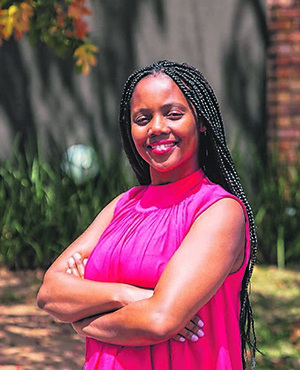
Mpolokeng Mudau (pictured) visited her gynaecologist for a routine checkup two months before she was to deliver her son, only to return home disappointed that she had been diagnosed with type 1 diabetes.
Although this happened in 2009, she remembers the incident vividly, saying she had complained to her doctor about an insatiable thirst during the consultation.
“No matter how much water I drank, I could not feel quenched,” recalls Mudau.
“I also experienced blurred vision. When the doctor ran some tests, he realised my sugar level was high,” she said, adding that when her blood sample was examined, she was found to have type 1 diabetes.
Mudau is one of more than 199 million women worldwide living with diabetes. Some of them will mark World Diabetes Day on Tuesday.
The day is meant to promote diabetes care, prevention and a cure worldwide.
This year’s theme is Women and Diabetes – our right to a healthy future.
Globally, there are 366 million people living with diabetes, and the International Diabetes Federation has predicted that this number could rise to 552 million by 2030.
Mudau (31) tells City Press that what frightens her most about diabetes is the thought of losing her eyesight.
“The minute the sugar levels in my body go up, my eyes become blurry,” she says, adding that the fear of losing her eyesight has kept her motivated to take her medication religiously.
She has familiarised herself with facts about the disease to such an extent that she now runs an empowerment community programme where, once a week, she holds regular talks with young girls about the illness to dispel the falsehoods surrounding the disease.
In some communities, for example, she says there is a prevailing belief that if no one in a family is diabetic, it is not possible for a person to be diagnosed with it.
Other myths include the belief that if a person is not fat, they cannot become diabetic – or if a person does not consume too much sugar, they cannot be diabetic.
Mudau says she often encourages young people to lead a healthy lifestyle to avoid all kinds of illnesses. She also teaches youngsters about hygiene and distributes sanitary towels.
Mudau believes that her diabetes had led her to her calling.
“It is as if my life was waiting for me to become diabetic in order to move forward,” she says.
However, her supportive husband often “watches me like a hawk” at meal times to ensure she makes the right choices.
“I was very lazy around the seventh month of my pregnancy. I was fairly big, lazy and tired,” she recalls.
“To be honest, I sometimes still have rough days when I want to let loose and eat whatever I want, and it’s hard. But I just snap out of it when I think about my children.”
Dr Larry Distiller, executive chairman of the Centre of Diabetes and Endocrinology, says South Africa has the biggest number of people diagnosed with diabetes on the continent, with Nigeria in second place.
He makes the distinction between diabetes type 1 and 2, saying type 1 occurs as a result of the destruction of insulin-producing cells in the pancreas, and it sometimes affects young people.
“Patients become insulin depleted and deficient, and they need to have insulin injections to survive. Type 1 diabetes is not preventable because it is a genetic condition,” he explains.
Type 2 diabetes is more of a lifestyle condition, says Distiller. It affects mainly older people – and sometimes young people.
Type 2 diabetes is associated with being overweight. However, Distiller is quick to point out that the effects of this type can be reduced “by leading a healthy lifestyle and keeping fit and active”.
Type 2 diabetes also occurs when a person’s insulin-producing cells are not entirely healthy, and are fragile and damaged.
“The cells can normally make enough insulin if you’re thin, but when you become overweight and inactive, you become resistant to insulin and so the cells cannot cope,” explains Distiller.
He recommends that people over the age of 40, and those who are overweight and inactive, should get tested every year by means of undergoing a simple blood test.
“Diabetes is not a death sentence; it is a life sentence.
"Once you are diagnosed with diabetes you need to be treated properly, monitored, followed up and managed for the rest of your life.
"If you do the right thing by following the rules, looking after yourself as a diabetic and keeping your blood pressure and cholesterol under control, you can live a long life with diabetes.”
There are three types of diabetes:
- TYPE 1 DIABETES – a condition where the body stops producing insulin, an essential hormone produced by the pancreas to convert glucose into energy;
- TYPE 2 DIABETES – a condition that develops over time where the body is unable to use insulin properly; and
- GESTATIONAL DIABETES – a form of diabetes that occurs during pregnancy because of hormonal changes, genetics and lifestyle factors.
Most South Africans with diabetes have type 2 diabetes.
The highest prevalence of diabetes among South Africans is in the Indian population (11% to 13%) as this group has a strong genetic predisposition for diabetes.
This is followed by 8% to 10% of people in the coloured community, 5% to 8% among blacks and 4% among whites.
TALK TO US
Do you think the myths about diabetes can be dispelled?
SMS us on 35697 using the keyword DIABETES and tell us what you think. Please include your name and province. SMSes cost R1.50




 Publications
Publications
 Partners
Partners















